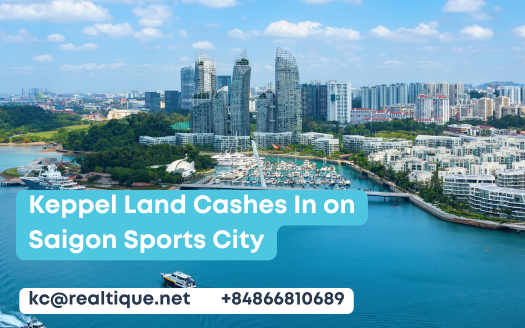Keppel Land Cashes In on Saigon Sports City
Keppel Land’s recent decision to sell a 70% stake in Saigon Sports City for over 7,400 billion dong marks a significant milestone in Vietnam’s developing real estate market. This strategic move, executed through its subsidiary Jencity, not only highlights the project’s expansive 64-hectare footprint in Ho Chi Minh City but also reflects a growing interest in integrated urban developments. With major stakeholders such as HTV Dai Phuoc Company and Vinobly joining the venture, the implications of this transaction extend beyond mere numbers, raising questions about the future of urban infrastructure in the region.
How does a strategic investment decision reshape the environment of real estate development?
The recent announcement by Singaporean investor Keppel Land to sell a 70% stake in Saigon Sports City exemplifies such a life-changing move. Valued at over 7,400 billion dong, this transaction marks a significant shift in the project’s path.
Jencity, a subsidiary of Keppel Land, is tasked with facilitating this stake transfer, emphasizing the firm’s structured approach to investment management.
The Saigon Sports City project, which spans 64 hectares in Ho Chi Minh City, is ready to enhance urban infrastructure and recreational alternatives, reflecting the increasing demand for integrated developments in Vietnam’s rapidly growing real estate market.
This strategic exit highlights Keppel Land’s adaptability in a changing investment environment.
Stake Distribution
In a significant move to distribute ownership of Saigon Sports City, Keppel Land has sold 70% of the project’s stake to two key investors.
HTV Dai Phuoc Company, based in Bien Hoa, Dong Nai Province, has acquired 35% of the stake, while Vinobly, a notable real estate investment firm operating at Vinhomes Grand Park in Thu Duc City, has secured the remaining 35%.
The total value of this stake transfer is estimated to exceed 7,440 billion dong, reflecting the project’s strong market potential.
The transaction, managed by Jencity, a subsidiary of Keppel Land, was officially announced on September 30.
This strategic divestment highlights Keppel Land’s commitment to nurturing partnerships in the changing Vietnamese real estate environment.
Saigon Sports City Project Features
Situated within the expansive Rach Chiec sports complex in An Phu Ward, Thu Duc City, Saigon Sports City is designed to be an all-encompassing urban development that integrates upscale residential areas, commercial spaces, and state-of-the-art sports facilities.
Covering 64 hectares, the project aims to create a lively community that caters to the needs of residents and visitors alike. The development will feature a range of amenities, including parks, retail outlets, and leisure facilities, nurturing a vibrant urban lifestyle.
Despite facing construction delays since its commencement in late 2019, Saigon Sports City is ready to enhance urban infrastructure and recreational amenities, aligning with the growing demand for integrated living spaces in Vietnam’s rapidly urbanizing environment.
Keppel Land's Presence
Keppel Land has established a strong foothold in Vietnam’s real estate market since the 1990s, becoming one of the leading foreign developers in the country.
The company has successfully undertaken several high-profile projects, including Estella Heights, Celesta Rise, and Empire City, each contributing significantly to the urban environment.
With a commitment to sustainable and innovative development practices, Keppel Land has played an essential part in shaping modern living environments in Vietnam.
Their focus on quality and community integration has not only enhanced urban infrastructure but has also set benchmarks for future developments.
Market Context
The Vietnamese real estate market is witnessing a strong influx of foreign investment, driven by a rising demand for integrated urban developments in major cities.
This trend is significantly enhanced by several key factors:
Urbanization: Rapid urban growth necessitates the development of all-encompassing residential and commercial spaces.
Economic Growth: Vietnam’s sturdy economic performance enhances investor confidence and stimulates real estate activities.
Government Initiatives: Policies promoting foreign direct investment are nurturing a more attractive environment for international stakeholders.
Sustainability Focus: Increasing demand for sustainable living solutions is steering investment towards eco-friendly integrated projects.
As seen with Saigon Sports City, these forces position the real estate sector as a critical component of Vietnam’s ongoing infrastructure modernization and urban enhancement efforts.





